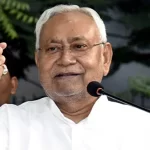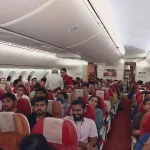NSA Ajit Doval offers its help to 5 countries to fight terror, drug trafficking, and cyber threats on Tuesday to boost collaboration and connectivity with the vital region.
Ajit Doval, national security adviser, extended the offer while attending the Kazakhstan-hosted second meeting of security officials from India and Central Asia. Noting that Central Asia and India share similar security challenges, he asserted that the shared region is threatened by “malicious actors operating through interconnected networks.”
Doval stated that the gathering is taking place during a period of profound global challenges, when dialogue is the only viable means of resolving conflicts and disagreements. It is imperative that all conflict resolution endeavors revolve around diplomacy, and India supports constructive and enduring dialogue with every Central Asian nation.
He stated that terrorism, in all its manifestations and forms, continues to be one of the gravest threats to international security, and that such acts are unjustifiable, irrespective of motivation or cause. He characterized drug trafficking as a grave threat frequently exploited by terrorist organizations and organized crime syndicates, and emphasized the critical nature of coordinating efforts to combat this issue.
Doval provided comprehensive, fully-funded capacity-building initiatives across various domains to combat terrorism and narcotics trafficking.
Doval stated that India will collaborate closely with Central Asian nations to assist them in constructing cyber defenses and establishing a secure cyber ecosystem. He extended invitations to the heads of cyber security agencies from Central Asian nations to visit India for a “strategic cyber experience.” This was done with the understanding that enhancing cooperation in this field requires capacity development and understanding of shared experiences.
Doval further delineated precise measures to enhance connectivity and economic integration with Central Asia, asserting that this constitutes a paramount objective for India. He stated that India is willing to provide Central Asian states with United Payment Interface (UPI) technology at no cost and to assist in the establishment of sovereign digital real-time payment systems tailored to the requirements of these nations.
These systems will benefit entrepreneurs, individuals seeking medical treatment in India, and Indian students studying in Central Asia by strengthening commercial ties.
Doval suggested that an India-Central Asia Rare Earths Forum be established in order to pursue collaborations in the field of strategic minerals. This measure will promote the involvement of private Indian enterprises in Central Asia with regards to collaborative economic development and investment. A collaboration of this nature ought to be transparent, mutually beneficial, and formulated to fulfill long-term objectives.
Doval stated, seemingly in retaliation against China’s Belt and Road Initiative (BRI), that maintaining the sovereignty and territorial integrity of all nations and ensuring that connectivity initiatives are “consultative, transparent, and participatory” are of utmost importance. He further stated that these initiatives ought to comply with environmental standards, guarantee financial sustainability, and avoid incurring debt obligations.
The lack of direct land access between India and Central Asia, according to Doval, is “an anomaly” and the “product of a deliberate policy of denial by a specific nation.” While refraining from specifying a nation, it was evident that he was alluding to Pakistan, a country whose borders have consistently denied the passage of Indian merchandise. “This situation is not only detrimental to the collective well-being of the entire region but also self-defeating for this nation,” Doval stated.
Aside from the fact that India is a participant in the Ashgabat Agreement and the International North-South Transport Corridor (INSTC), Doval extended an invitation to the Central Asian nations to conduct maritime commerce through Iran’s Chabahar port, where the Shaheed Bahesti terminal is operated by an Indian company. Furthermore, he solicited their endorsement to incorporate the Chabahar port into the INSTC framework.
The imminent accession of Uzbekistan and Turkmenistan to the INSTC will bring the total number of Central Asian nations participating in this trade corridor to five.
Additionally, Doval mentioned the Afghanistan situation, stating that it continues to be a matter of concern for all nations in the region. He stated, “Protecting the rights of women, children, and minorities, ensuring the formation of a truly inclusive and representative government, and combating terrorism and drug trafficking are our immediate shared objectives.”
He stated that India is actively engaged in the provision of humanitarian assistance to the Afghan people. As part of India’s initiative to promote sports in Afghanistan, the Afghan cricket team is currently present in the nation to compete in the ICC World Cup. The principal sponsor of the Afghan team for these matches is the Indian company Amul.
Political, commercial, economic, defense, and security relations between India and Central Asia have evolved into multifaceted, mutually beneficial ties founded on trust, understanding, and affinity, according to Doval. Extensive cultural and interpersonal ties are the most robust link between the two parties; India is planning to host a seminar featuring eminent scholars and clerics. He stated that this would promote a more profound comprehension of the historical background and contextual framework of Islam, as well as its contribution to the advancement of harmonious social coexistence and peace in an intricate global landscape.
The Central Asian states’ highest-ranking security officials expressed their approval of India’s proposals to enhance relations in various domains. They underscored the significance of consistent communication among the Security Councils of the nations in light of prevalent challenges in the region, including terrorism, extremism, and radicalization.
Also read this:1st sitting of Bihar House since release of caste survey to commence on Nov 6
New Delhi hosted the inaugural gathering of senior security officials from India and Central Asia in December 2022, subsequent to the resolution achieved at the inaugural India-Central Asia Summit in January 2022. Senior officials from India, Kazakhstan, Kyrgyzstan, Tajikistan, and Uzbekistan were in attendance at the meeting on Tuesday. The embassy of Turkmenistan was present in Astana to represent the country.




